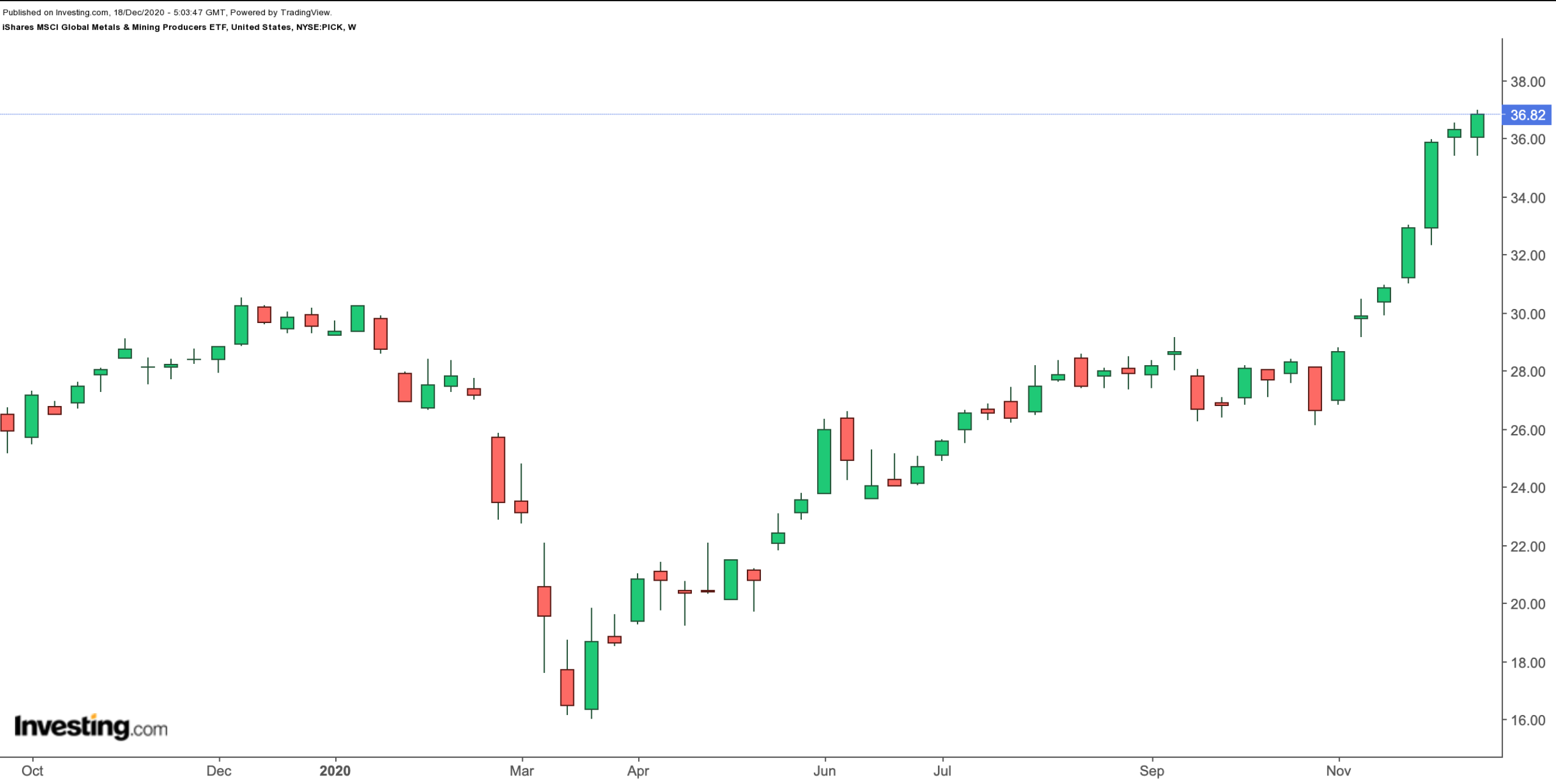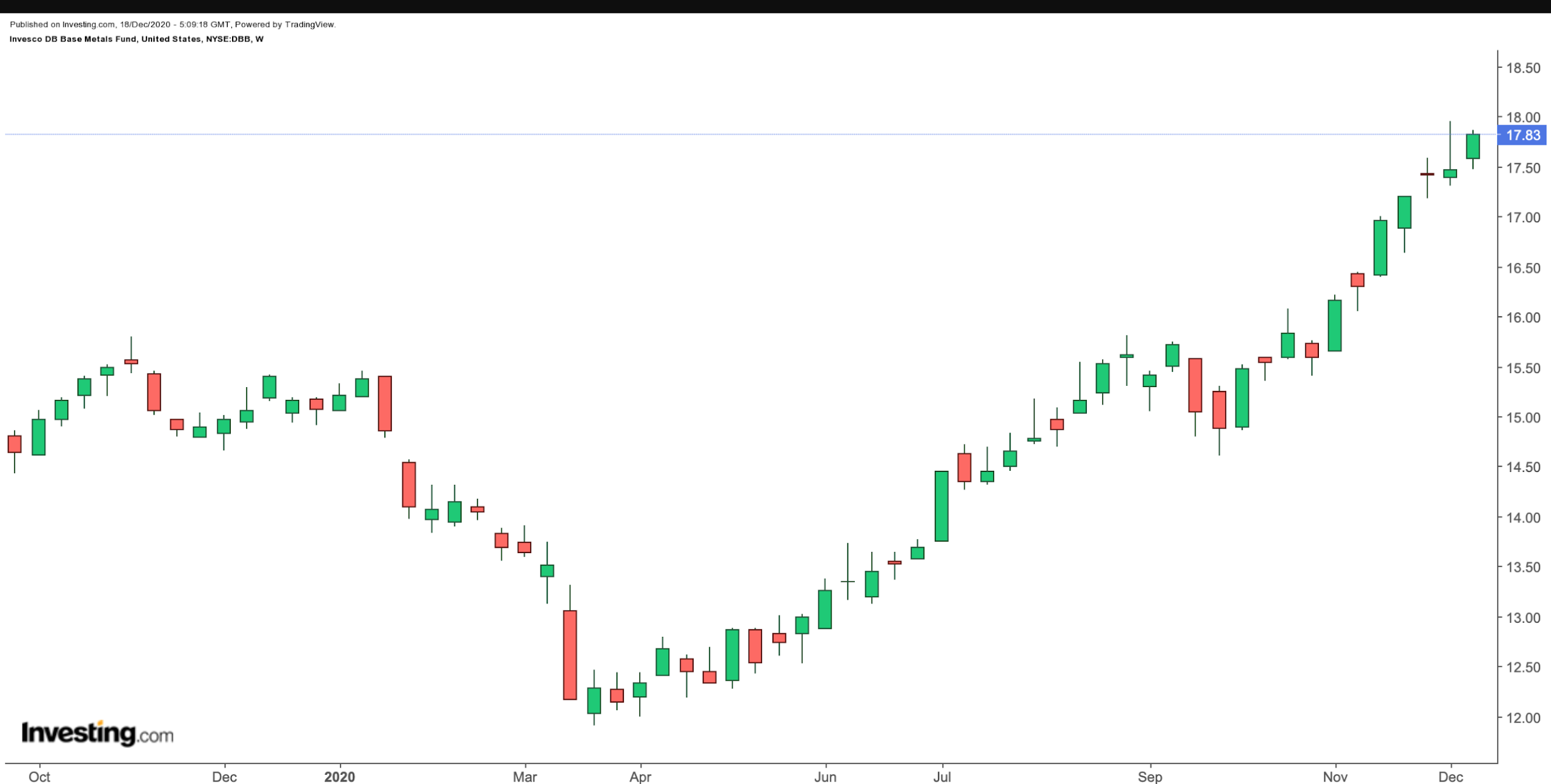Wall Street has long been regarded as a forecasting tool. Recent positive momentum in equity markets across many sectors, including industrial metals, is possibly pricing in speedy global economic recovery.
In addition, many analysts expect robust US demand from infrastructure and construction projects under the incoming Biden administration.
Base metals, like aluminum, copper, lead, nickel, tin and zinc, are used extensively in a range of industries. Similarly, iron ore, a market where Australia dominates, is used in steel-making.
China has become the largest consumer of raw materials globally, fuelled by rapid industrialization and urbanization. For instance, recent numbers indicate:
"Government stimulus measures introduced earlier this year to fire up China’s post-COVID economy have seen steel production, in particular, ramp up. The three-month period from July-September saw steel output in China ... rise by 10%."
We previously discussed several exchange-traded funds (ETFs) as well as mostly FTSE-listed global businesses that provide exposure to industrial metals and mining.
Here, we introduce two more funds that could be appropriate for investors who are expecting the global economic recovery to continue to drive industrial metals higher.
1. iShares MSCI Global Metals & Mining Producers ETF
- Current Price: $36.82
- 52-Week Range: $16.01 – $36.82
- Dividend Yield: 2.31%
- Expense Ratio: 0.39%
The iShares MSCI Global Metals & Mining Producers ETF (NYSE:PICK) provides exposure to companies that are involved in the extraction and production of diversified metals, aluminum, steel, precious metals and minerals.

PICK, which has 196 holdings, tracks the MSCI ACWI Select Metals & Mining Producers Ex Gold & Silver Investable Market Index. The fund started trading in January 2012 and has around $434 million in assets.
In terms of sectors, diversified metals and mining have the highest allocation (50.47%), followed by steel (33.15%) and copper (9.30%). The ETF includes many global names. Just over 25% of the companies come from the UK. Next in line are Australia (21.50%), the US (11.04%), Brazil (8.30%) and Japan (4.88%).
The top 10 names make up around 53% of assets in the fund. BHP Group (NYSE:BHP) (SA:BHPG34), Rio Tinto (NYSE:RIO), Vale (NYSE:VALE), Anglo American (OTC:NGLOY) and Freeport-McMoran (NYSE:FCX) lead the businesses in PICK.
So far in the year, the fund is up around 22% and hit a record high in recent days. The trailing P/E and P/B ratios are 12.35% and 1.56%, respectively. We like the diversification this fund offers as well as exposure to copper, which has been having a great year in 2020.
According to derivatives marketplace CME Group, since the great recession of 2008/09, “the copper market has generally assumed the role of long-term macroeconomic indicator,” and it has been referred to as “Doctor Copper in economics.”
Finally, shares of many of these mining companies would possibly appreciate in an inflationary environment that could come as a result of liquidity and stimulus provided by global central banks, including the Fed.
2. Invesco DB Base Metals Fund
- Current Price: $17.83
- 52-Week Range: $11.91 – $17.95
- Dividend Yield: 1.55%
- Expense Ratio: 0.84%
Our next exchange-traded fund is a futures-based commodity fund. The Invesco DB Base Metals Fund (NYSE:DBB) enables market participants to invest in commodity futures of aluminum, zinc and copper. Some of the assets are also held in US Treasury securities.

DBB, which started trading in 2007, tracks the DBIQ Optimum Yield Industrial Metals Index Excess Return index. Assets under management are around $165 million.
Year-to-date, DBB has returned over 17%. We believe the long-term bullish move in many of these metals may be in its early stages. The markets use the US dollar as the pricing benchmark for most raw materials and base metals. Therefore a decline in the greenback typically means higher prices for these commodities.
On a final note, futures of base metals are heavily traded in the London Metal Exchange (LME). Therefore, potential investors may want to keep prices as well as developments in LME on their radar, too. In 2012, the Hong Kong stock exchange bought the London Metal Exchange for £1.4 billion (or $1.9 billion). Put another way, China, which is the most important demand side of the equation in industrial metals, owns the most important exchange in base metals as well as its warehouses.
